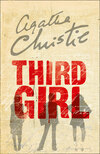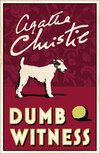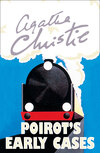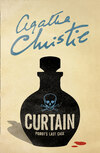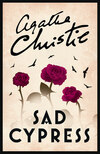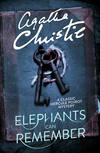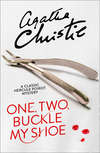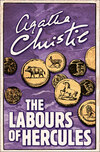Kitabı oku: «Third Girl», sayfa 2
Out of the corner of her eye, Mrs Oliver perceived Poirot signalling wildly to her.
‘Just a moment, darling,’ said Mrs Oliver into the telephone. ‘It’s the baker.’ Poirot looked affronted. ‘Hang on.’
She laid down the receiver, hurried across the room, and backed Poirot into a breakfast nook.
‘Yes,’ she demanded breathlessly.
‘A baker,’ said Poirot with scorn. ‘Me!’
‘Well, I had to think of something quickly. What were you signalling about? Did you understand what she—’
Poirot cut her short.
‘You shall tell me presently. I know enough. What I want you to do is, with your rapid powers of improvisation, to arrange some plausible pretext for me to visit the Restaricks—an old friend of yours, shortly to be in the neighbourhood. Perhaps you could say—’
‘Leave it to me. I’ll think of something. Shall you give a false name?’
‘Certainly not. Let us at least try to keep it simple.’
Mrs Oliver nodded, and hurried back to the abandoned telephone.
‘Naomi? I can’t remember what we were saying. Why does something always come to interrupt just when one has settled down to a nice gossip? I can’t even remember now what I rang you up for to begin with—Oh yes—that child Thora’s address—Norma, I mean—and you gave it to me. But there was something else I wanted to—oh, I remember. An old friend of mine. A most fascinating little man. Actually I was talking about him the other day down there. Hercule Poirot his name is. He’s going to be staying quite close to the Restaricks and he is most tremendously anxious to meet old Sir Roderick. He knows a lot about him and has a terrific admiration for him, and for some wonderful discovery of his in the war—or some scientific thing he did—anyway, he is very anxious to “call upon him and present his respects”, that’s how he put it. Will that be all right, do you think? Will you warn them? Yes, he’ll probably just turn up out of the blue. Tell them to make him tell them some wonderful espionage stories… He—what? Oh! your mowers? Yes, of course you must go. Goodbye.’
She put back the receiver and sank down in an armchair. ‘Goodness, how exhausting. Was that all right?’
‘Not bad,’ said Poirot.
‘I thought I’d better pin it all to the old boy. Then you’ll get to see the lot which I suppose is what you want. And one can always be vague about scientific subjects if one is a woman, and you can think up something more definite that sounds probable by the time you arrive. Now, do you want to hear what she was telling me?’
‘There has been gossip, I gather. About the health of Mrs Restarick?’
‘That’s it. It seems she had some kind of mysterious illness—gastric in nature—and the doctors were puzzled. They sent her into hospital and she got quite all right, but there didn’t seem any real cause to account for it. And she went home, and it all began to start again—and again the doctors were puzzled. And then people began to talk. A rather irresponsible nurse started it and her sister told a neighbour, and the neighbour went out on daily work and told someone else, and how queer it all was. And then people began saying that her husband must be trying to poison her. The sort of thing people always say—but in this case it really didn’t seem to make sense. And then Naomi and I wondered about the au pair girl, she’s a kind of secretary companion to the old boy—so really there isn’t any kind of reason why she should administer weed killer to Mrs Restarick.’
‘I heard you suggesting a few.’
‘Well, there is usually something possible…’
‘Murder desired…’ said Poirot thoughtfully…‘But not yet committed.’
CHAPTER 3
Mrs Oliver drove into the inner court of Borodene Mansions. There were six cars filling the parking space. As Mrs Oliver hesitated, one of the cars reversed out and drove away. Mrs Oliver hurried neatly into the vacant space.
She descended, banged the door and stood looking up to the sky. It was a recent block, occupying a space left by the havoc of a land mine in the last war. It might, Mrs Oliver thought, have been lifted en bloc from the Great West Road and, first deprived of some such legend as SKYLARK’S FEATHER RAZOR BLADES, have been deposited as a block of flats in situ. It looked extremely functional and whoever had built it had obviously scorned any ornamental additions.
It was a busy time. Cars and people were going in and out of the courtyard as the day’s work came to a close.
Mrs Oliver glanced down at her wrist. Ten minutes to seven. About the right time, as far as she could judge. The kind of time when girls in jobs might be presumed to have returned, either to renew their make up, change their clothes to tight exotic pants or whatever their particular addiction was, and go out again, or else to settle down to home life and wash their smalls and their stockings. Anyway, quite a sensible time to try. The block was exactly the same on the east and the west, with big swing doors set in the centre. Mrs Oliver chose the left hand side but immediately found that she was wrong. All this side was numbers from 100 to 200. She crossed over to the other side.
No. 67 was on the sixth floor. Mrs Oliver pressed the button of the lift. The doors opened like a yawning mouth with a menacing clash. Mrs Oliver hurried into the yawning cavern. She was always afraid of modern lifts.
Crash. The doors came to again. The lift went up. It stopped almost immediately (that was frightening too!). Mrs Oliver scuttled out like a frightened rabbit.
She looked up at the wall and went along the right hand passage. She came to a door marked 67 in metal numbers affixed to the centre of the door. The numeral 7 detached itself and fell on her feet as she arrived.
‘This place doesn’t like me,’ said Mrs Oliver to herself as she winced with pain and picked the number up gingerly and affixed it by its spike to the door again.
She pressed the bell. Perhaps everyone was out.
However, the door opened almost at once. A tall handsome girl stood in the doorway. She was wearing a dark well-cut suit with a very short skirt, a white silk shirt, and was very well shod. She had swept-up dark hair, good but discreet make up, and for some reason was slightly alarming to Mrs Oliver.
‘Oh,’ said Mrs Oliver, galvanizing herself to say the right thing. ‘Is Miss Restarick in, by any chance?’
‘No, I’m sorry, she’s out. Can I give her a message?’
Mrs Oliver said, ‘Oh’ again—before proceeding. She made a play of action by producing a parcel rather untidily done up in brown paper. ‘I promised her a book,’ she explained. ‘One of mine that she hadn’t read. I hope I’ve remembered actually which it was. She won’t be in soon, I suppose?’
‘I really couldn’t say. I don’t know what she is doing tonight.’
‘Oh. Are you Miss Reece-Holland?’
The girl looked slightly surprised.
‘Yes, I am.’
‘I’ve met your father,’ said Mrs Oliver. She went on, ‘I’m Mrs Oliver. I write books,’ she added in the usual guilty style in which she invariably made such an announcement.
‘Won’t you come in?’
Mrs Oliver accepted the invitation, and Claudia Reece-Holland led her into a sitting-room. All the rooms of the flats were papered the same with an artificial raw wood pattern. Tenants could then display their modern pictures or apply any forms of decoration they fancied. There was a foundation of modern built-in furniture, cupboard, bookshelves and so on, a large settee and a pull-out type of table. Personal bits and pieces could be added by the tenants. There were also signs of individuality displayed here by a gigantic Harlequin pasted on one wall, and a stencil of a monkey swinging from branches of palm fronds on another wall.
‘I’m sure Norma will be thrilled to get your book, Mrs Oliver. Won’t you have a drink? Sherry? Gin?’
This girl had the brisk manner of a really good secretary. Mrs Oliver refused.
‘You’ve got a splendid view up here,’ she said, looking out of the window and blinking a little as she got the setting sun straight in her eyes.
‘Yes. Not so funny when the lift goes out of order.’
‘I shouldn’t have thought that lift would dare to go out of order. It’s so—so—robot-like.’
‘Recently installed, but none the better for that,’ said Claudia. ‘It needs frequent adjusting and all that.’
Another girl came in, talking as she entered.
‘Claudia, have you any idea where I put—’
She stopped, looking at Mrs Oliver.
Claudia made a quick introduction.
‘Frances Cary—Mrs Oliver. Mrs Ariadne Oliver.’
‘Oh, how exciting,’ said Frances.
She was a tall willowy girl, with long black hair, a heavily made up dead white face, and eyebrows and eyelashes slightly slanted upwards—the effect heightened by mascara. She wore tight velvet pants and a heavy sweater. She was a complete contrast to the brisk and efficient Claudia.
‘I brought a book I’d promised Norma Restarick,’ said Mrs Oliver.
‘Oh!—what a pity she’s still in the country.’
‘Hasn’t she come back?’
There was quite definitely a pause. Mrs Oliver thought the two girls exchanged a glance.
‘I thought she had a job in London,’ said Mrs Oliver, endeavouring to convey innocent surprise.
‘Oh yes,’ said Claudia. ‘She’s in an interior decorating place. She’s sent down with patterns occasionally to places in the country.’ She smiled. ‘We live rather separate lives here,’ she explained. ‘Come and go as we like—and don’t usually bother to leave messages. But I won’t forget to give her your book when she does get back.’
Nothing could have been easier than the casual explanation.
Mrs Oliver rose. ‘Well, thank you very much.’
Claudia accompanied her to the door. ‘I shall tell my father I’ve met you,’ she said. ‘He’s a great reader of detective stories.’
Closing the door she went back into the sitting-room.
The girl Frances was leaning against the window.
‘Sorry,’ she said. ‘Did I boob?’
‘I’d just said that Norma was out.’
Frances shrugged her shoulders.
‘I couldn’t tell. Claudia, where is that girl? Why didn’t she come back on Monday? Where has she gone?’
‘I can’t imagine.’
‘She didn’t stay on down with her people? That’s where she went for the weekend.’
‘No. I rang up, actually, to find out.’
‘I suppose it doesn’t really matter… All the same, she is—well, there’s something queer about her.’
‘She’s not really queerer than anyone else.’ But the opinion sounded uncertain.
‘Oh yes, she is,’ said Frances. ‘Sometimes she gives me the shivers. She’s not normal, you know.’
She laughed suddenly.
‘Norma isn’t normal! You know she isn’t, Claudia, although you won’t admit it. Loyalty to your employer, I suppose.’
CHAPTER 4
Hercule Poirot walked along the main street of Long Basing. That is, if you can describe as a main street a street that is to all intents and purposes the only street, which was the case in Long Basing. It was one of those villages that exhibit a tendency to length without breadth. It had an impressive church with a tall tower and a yew tree of elderly dignity in its churchyard. It had its full quota of village shops disclosing much variety. It had two antique shops, one mostly consisting of stripped pine chimney pieces, the other disclosing a full house of piled up ancient maps, a good deal of porcelain, most of it chipped, some worm-eaten old oak chests, shelves of glass, some Victorian silver, all somewhat hampered in display by lack of space. There were two cafés, both rather nasty, there was a basket shop, quite delightful, with a large variety of home-made wares, there was a post office-cum-greengrocer, there was a draper’s which dealt largely in millinery and also a shoe department for children and a large miscellaneous selection of haberdashery of all kinds. There was a stationery and newspaper shop which also dealt in tobacco and sweets. There was a wool shop which was clearly the aristocrat of the place. Two white-haired severe women were in charge of shelves and shelves of knitting materials of every description. Also large quantities of dress-making patterns and knitting patterns and which branched off into a counter for art needlework. What had lately been the local grocer’s had now blossomed into calling itself ‘a supermarket’ complete with stacks of wire baskets and packaged materials of every cereal and cleaning material, all in dazzling paper boxes. And there was a small establishment with one small window with Lillah written across it in fancy letters, a fashion display of one French blouse, labelled ‘Latest chic’, and a navy skirt and a purple striped jumper labelled ‘separates’. These were displayed by being flung down as by a careless hand in the window.
All of this Poirot observed with a detached interest. Also contained within the limits of the village and facing on the street were several small houses, old-fashioned in style, sometimes retaining Georgian purity, more often showing some signs of Victorian improvement, as a veranda, bow window, or a small conservatory. One or two houses had had a complete face lift and showed signs of claiming to be new and proud of it. There were also some delightful and decrepit old-world cottages, some pretending to be a hundred or so years older than they were, others completely genuine, any added comforts of plumbing or such being carefully hidden from any casual glance.
Poirot walked gently along digesting all that he saw. If his impatient friend, Mrs Oliver, had been with him, she would have immediately demanded why he was wasting time, as the house to which he was bound was a quarter of a mile beyond the village limits. Poirot would have told her that he was absorbing the local atmosphere; that these things were sometimes important. At the end of the village there came an abrupt transition. On one side, set back from the road, was a row of newly built council houses, a strip of green in front of them and a gay note set by each house having been given a different coloured front door. Beyond the council houses the sway of fields and hedges resumed its course interspersed now and then by the occasional ‘desirable residences’ of a house agent’s list, with their own trees and gardens and a general air of reserve and of keeping themselves to themselves. Ahead of him farther down the road Poirot descried a house, the top storey of which displayed an unusual note of bulbous construction. Something had evidently been tacked on up there not so many years ago. This no doubt was the Mecca towards which his feet were bent. He arrived at a gate to which the nameplate Crosshedges was attached. He surveyed the house. It was a conventional house dating perhaps to the beginning of the century. It was neither beautiful nor ugly. Commonplace was perhaps the word to describe it. The garden was more attractive than the house and had obviously been the subject of a great deal of care and attention in its time, though it had been allowed to fall into disarray. It still had smooth green lawns, plenty of flower beds, carefully planted areas of shrubs to display a certain landscape effect. It was all in good order. A gardener was certainly employed in this garden, Poirot reflected. A personal interest was perhaps also taken, since he noted in a corner near the house a woman bending over one of the flower beds, tying up dahlias, he thought. Her head showed as a bright circle of pure gold colour. She was tall, slim but square-shouldered. He unlatched the gate, passed through and walked up towards the house. The woman turned her head and then straightened herself, turning towards him inquiringly.
She remained standing, waiting for him to speak, some garden twine hanging from her left hand. She looked, he noted, puzzled.
‘Yes?’ she said.
Poirot, very foreign, took off his hat with a flourish and bowed. Her eyes rested on his moustaches with a kind of fascination.
‘Mrs Restarick?’
‘Yes. I—’
‘I hope I do not derange you, Madame.’
A faint smile touched her lips. ‘Not at all. Are you—’
‘I have permitted myself to pay a visit on you. A friend of mine, Mrs Ariadne Oliver—’
‘Oh, of course. I know who you must be. Monsieur Poiret.’
‘Monsieur Poirot,’ he corrected her with an emphasis on the last syllable. ‘Hercule Poirot, at your service. I was passing through this neighbourhood and I ventured to call upon you here in the hope that I might be allowed to pay my respects to Sir Roderick Horsefield.’
‘Yes. Naomi Lorrimer told us you might turn up.’
‘I hope it is not inconvenient?’
‘Oh, it is not inconvenient at all. Ariadne Oliver was here last weekend. She came over with the Lorrimers. Her books are most amusing, aren’t they? But perhaps you don’t find detective stories amusing. You are a detective yourself, aren’t you—a real one?’
‘I am all that there is of the most real,’ said Hercule Poirot.
He noticed that she repressed a smile. He studied her more closely. She was handsome in a rather artificial fashion. Her golden hair was stiffly arranged. He wondered whether she might not at heart be secretly unsure of herself, whether she were not carefully playing the part of the English lady absorbed in her garden. He wondered a little what her social background might have been.
‘You have a very fine garden here,’ he said.
‘You like gardens?’
‘Not as the English like gardens. You have for a garden a special talent in England. It means something to you that it does not to us.’
‘To French people, you mean? Oh yes. I believe that Mrs Oliver mentioned that you were once with the Belgian Police Force?’
‘That is so. Me, I am an old Belgian police dog.’ He gave a polite little laugh and said, waving his hands, ‘But your gardens, you English, I admire. I sit at your feet! The Latin races, they like the formal garden, the gardens of the château, the Château of Versailles in miniature, and also of course they invented the potager. Very important, the potager. Here in England you have the potager, but you got it from France and you do not love your potager as much as you love your flowers. Hein? That is so?’
‘Yes, I think you are right,’ said Mary Restarick. ‘Do come into the house. You came to see my uncle.’
‘I came, as you say, to pay homage to Sir Roderick, but I pay homage to you also, Madame. Always I pay homage to beauty when I meet it.’ He bowed.
She laughed with slight embarrassment. ‘You mustn’t pay me so many compliments.’
She led the way through an open french window and he followed her.
‘I knew your uncle slightly in 1944.’
‘Poor dear, he’s getting quite an old man now. He’s very deaf, I’m afraid.’
‘It was long ago that I encountered him. He will probably have forgotten. It was a matter of espionage and of scientific developments of a certain invention. We owed that invention to the ingenuity of Sir Roderick. He will be willing, I hope, to receive me.’
‘Oh, I’m sure he’ll love it,’ said Mrs Restarick. ‘He has rather a dull life in some ways nowadays. I have to be so much in London—we are looking for a suitable house there.’ She sighed and said, ‘Elderly people can be very difficult sometimes.’
‘I know,’ said Poirot. ‘Frequently I, too, am difficult.’
She laughed. ‘Ah no, M. Poirot, come now, you mustn’t pretend you’re old.’
‘Sometimes I am told so,’ said Poirot. He sighed. ‘By young girls,’ he added mournfully.
‘That’s very unkind of them. It’s probably the sort of thing that our daughter would do,’ she added.
‘Ah, you have a daughter?’
‘Yes. At least, she is my stepdaughter.’
‘I shall have much pleasure in meeting her,’ said Poirot politely.
‘Oh well, I’m afraid she is not here. She’s in London. She works there.’
‘The young girls, they all do jobs nowadays.’
‘Everybody’s supposed to do a job,’ said Mrs Restarick vaguely. ‘Even when they get married they’re always being persuaded back into industry or back into teaching.’
‘Have they persuaded you, Madame, to come back into anything?’
‘No. I was brought up in South Africa. I only came here with my husband a short time ago—It’s all—rather strange to me still.’
She looked round her with what Poirot judged to be an absence of enthusiasm. It was a handsomely furnished room of a conventional type—without personality. Two large portraits hung on the walls—the only personal touch. The first was that of a thin lipped woman in a grey velvet evening dress. Facing her on the opposite wall was a man of about thirty-odd with an air of repressed energy about him.
‘Your daughter, I suppose, finds it dull in the country?’
‘Yes, it is much better for her to be in London. She doesn’t like it here.’ She paused abruptly, and then as though the last words were almost dragged out of her, she said, ‘—and she doesn’t like me.’
‘Impossible,’ said Hercule Poirot, with Gallic politeness.
‘Not at all impossible! Oh well, I suppose it often happens. I suppose it’s hard for girls to accept a stepmother.’
‘Was your daughter very fond of her own mother?’
‘I suppose she must have been. She’s a difficult girl. I suppose most girls are.’
Poirot sighed and said, ‘Mothers and fathers have much less control over daughters nowadays. It is not as it used to be in the old good-fashioned days.’
‘No indeed.’
‘One dare not say so, Madame, but I must confess I regret that they show so very little discrimination in choosing their—how do you say it?—their boy friends?’
‘Norma has been a great worry to her father in that way. However, I suppose it is no good complaining. People must make their own experiments. But I must take you up to Uncle Roddy—he has his own rooms upstairs.’
She led the way out of the room. Poirot looked back over his shoulder. A dull room, a room without character—except perhaps for the two portraits. By the style of the woman’s dress, Poirot judged that they dated from some years back. If that was the first Mrs Restarick, Poirot did not think that he would have liked her.
He said, ‘Those are fine portraits, Madame.’
‘Yes. Lansberger did them.’
It was the name of a famous and exceedingly expensive fashionable portrait painter of twenty years ago. His meticulous naturalism had now gone out of fashion, and since his death, he was little spoken of. His sitters were sometimes sneeringly spoken of as ‘clothes props’, but Poirot thought they were a good deal more than that. He suspected that there was a carefully concealed mockery behind the smooth exteriors that Lansberger executed so effortlessly.
Mary Restarick said as she went up the stairs ahead of him:
‘They have just come out of storage—and been cleaned up and—’
She stopped abruptly—coming to a dead halt, one hand on the stair-rail.
Above her, a figure had just turned the corner of the staircase on its way down. It was a figure that seemed strangely incongruous. It might have been someone in fancy dress, someone who certainly did not match with this house.
He was a figure familiar enough to Poirot in different conditions, a figure often met in the streets of London or even at parties. A representative of the youth of today. He wore a black coat, an elaborate velvet waistcoat, skin tight pants, and rich curls of chestnut hair hung down on his neck. He looked exotic and rather beautiful, and it needed a few moments to be certain of his sex.
‘David!’ Mary Restarick spoke sharply. ‘What on earth are you doing here?’
The young man was by no means taken aback. ‘Startled you?’ he asked. ‘So sorry.’
‘What are you doing here—in this house? You—have you come down here with Norma?’
‘Norma? No, I hoped to find her here.’
‘Find her here—what do you mean? She’s in London.’
‘Oh, but my dear, she isn’t. At any rate, she’s not at 67 Borodene Mansions.’
‘What do you mean, she isn’t there?’
‘Well, since she didn’t come back this weekend, I thought she was probably here with you. I came down to see what she was up to.’
‘She left here Sunday night as usual.’ She added in an angry voice, ‘Why didn’t you ring the bell and let us know you were here? What are you doing roaming about the house?’
‘Really, darling, you seem to be thinking I’m going to pinch the spoons or something. Surely it’s natural to walk into a house in broad daylight. Why ever not?’
‘Well, we’re old-fashioned and we don’t like it.’
‘Oh dear, dear.’ David sighed. ‘The fuss everyone makes. Well, my dear, if I’m not going to have a welcome and you don’t seem to know where your stepdaughter is, I suppose I’d better be moving along. Shall I turn out my pockets before I go?’
‘Don’t be absurd, David.’
‘Ta-ta, then.’ The young man passed them, waved an airy hand and went on down and out through the open front door.
‘Horrible creature,’ said Mary Restarick, with a sharpness of rancour that startled Poirot. ‘I can’t bear him. I simply can’t stand him. Why is England absolutely full of these people nowadays?’
‘Ah, Madame, do not disquiet yourself. It is all a question of fashion. There have always been fashions. You see less in the country, but in London you meet plenty of them.’
‘Dreadful,’ said Mary. ‘Absolutely dreadful. Effeminate, exotic.’
‘And yet not unlike a Vandyke portrait, do you not think so, Madame? In a gold frame, wearing a lace collar, you would not then say he was effeminate or exotic.’
‘Daring to come down here like that. Andrew would have been furious. It worries him dreadfully. Daughters can be very worrying. It’s not even as though Andrew knew Norma well. He’s been abroad since she was a child. He left her entirely to her mother to bring up, and now he finds her a complete puzzle. So do I for that matter. I can’t help feeling that she is a very odd type of girl. One has no kind of authority over them these days. They seem to like the worst type of young men. She’s absolutely infatuated with this David Baker. One can’t do anything. Andrew forbade him the house, and look, he turns up here, walks in as cool as a cucumber. I think—I almost think I’d better not tell Andrew. I don’t want him to be unduly worried. I believe she goes about with this creature in London, and not only with him. There are some much worse ones even. The kind that don’t wash, completely unshaven faces and funny sprouting beards and greasy clothes.’
Poirot said cheerfully, ‘Alas, Madame, you must not distress yourself. The indiscretions of youth pass.’
‘I hope so, I’m sure. Norma is a very difficult girl. Sometimes I think she’s not right in the head. She’s so peculiar. She really looks sometimes as though she isn’t all there. These extraordinary dislikes she takes—’
‘Dislikes?’
‘She hates me. Really hates me. I don’t see why it’s necessary. I suppose she was very devoted to her mother, but after all it’s only reasonable that her father should marry again, isn’t it?’
‘Do you think she really hates you?’
‘Oh, I know she does. I’ve had ample proof of it. I can’t say how relieved I was when she went off to London. I didn’t want to make trouble—’ She stopped suddenly. It was as though for the first time she realised that she was talking to a stranger.
Poirot had the capacity to attract confidences. It was as though when people were talking to him they hardly realised who it was they were talking to. She gave a short laugh now.
‘Dear me,’ she said, ‘I don’t really know why I’m saying all this to you. I expect every family has these problems. Poor stepmothers, we have a hard time of it. Ah, here we are.’
She tapped on a door.
‘Come in, come in.’
It was a stentorian roar.
‘Here is a visitor to see you, Uncle,’ said Mary Restarick, as she walked into the room, Poirot behind her.
A broad-shouldered, square-faced, red-cheeked, irascible looking elderly man had been pacing the floor. He stumped forward towards them. At the table behind him a girl was sitting sorting letters and papers. Her head was bent over them, a sleek, dark head.
‘This is Monsieur Hercule Poirot, Uncle Roddy,’ said Mary Restarick.
Poirot stepped forward gracefully into action and speech. ‘Ah, Sir Roderick, it is many years—many years since I have had the pleasure of meeting you. We have to go back, so far as the last war. It was, I think, in Normandy the last time. How well I remember, there was there also Colonel Race and there was General Abercromby and there was Air-Marshal Sir Edmund Collingsby. What decisions we had to take! And what difficulties we had with security. Ah, nowadays, there is no longer the need for secrecy. I recall the unmasking of that secret agent who succeeded for so long—you remember Captain Henderson.’
‘Ah. Captain Henderson indeed. Lord, that damned swine! Unmasked!’
‘You may not remember me, Hercule Poirot.’
‘Yes, yes, of course I remember you. Ah, it was a close shave that, a close shave. You were the French representative, weren’t you? There were one or two of them, one I couldn’t get on with—can’t remember his name. Ah well, sit down, sit down. Nothing like having a chat over old days.’
‘I feared so much that you might not remember me or my colleague, Monsieur Giraud.’
‘Yes, yes, of course I remember both of you. Ah, those were the days, those were the days indeed.’
The girl at the table got up. She moved a chair politely towards Poirot.
‘That’s right, Sonia, that’s right,’ said Sir Roderick. ‘Let me introduce you,’ he said, ‘to my charming little secretary here. Makes a great difference to me. Helps me, you know, files all my work. Don’t know how I ever got on without her.’
Poirot bowed politely. ‘Enchanté, mademoiselle,’ he murmured.
The girl murmured something in rejoinder. She was a small creature with black bobbed hair. She looked shy. Her dark blue eyes were usually modestly cast down, but she smiled up sweetly and shyly at her employer. He patted her on the shoulder.
